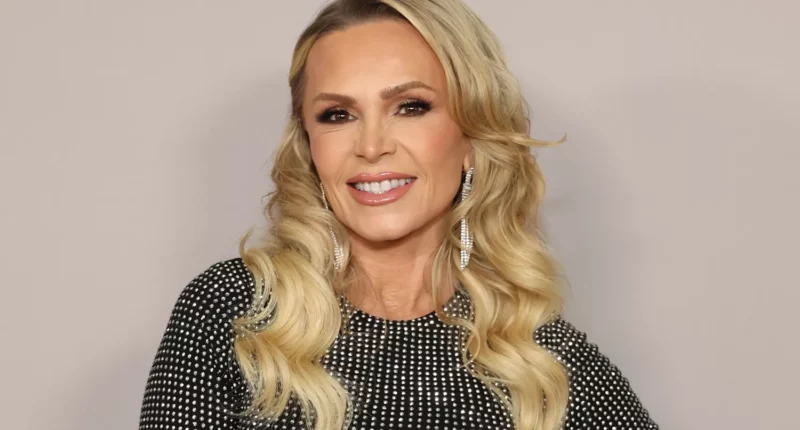In the emotionally charged season 19 premiere of The Real Housewives of Orange County, aired Thursday, July 10, Tamra Judge offered viewers a rare glimpse into her private struggle with mental health. The reality star, often seen as the franchise’s fiery centerpiece, appeared in therapy where she revisited deeply buried trauma that, until now, had remained unresolved. It was a stark departure from the bold, outspoken persona fans have come to expect. But for Judge, the decision to face her past head-on was not only courageous—it was necessary.
As cameras rolled, Tamra described how resurfacing long-suppressed experiences caused a deterioration in her mental health. “I’m finally addressing the pain I buried for years,” she confessed. Her therapist guided her through these raw revelations, helping her unpack the emotional toll of living under constant public scrutiny while privately grappling with identity, pain, and confusion. What sparked this therapeutic journey wasn’t just personal—it was public backlash.
:max_bytes(150000):strip_icc():focal(733x328:735x330):format(webp)/tamra-judge-the-traitors-experience-101524-1-1d639a3d45b24599a70fdc12d640bf1f.jpg)
Why Tamra Judge Faced Backlash Over Her Autism Comment
In October 2024, Judge made headlines when she candidly shared that she believed she was “on the spectrum,” a colloquial phrase used to reference Autism Spectrum Disorder (ASD). Her statement, made during a podcast interview, was meant to be introspective—a reflection on behavioral traits and emotional sensitivities that she’d struggled to articulate for years. However, the reaction was swift and largely critical. Many accused her of self-diagnosing without proper evaluation, while others believed she was trivializing a serious neurodevelopmental disorder.
Autism spectrum disorder affects approximately 1 in 36 children in the United States, according to the CDC’s 2023 estimates. The term “spectrum” refers to the wide range of symptoms, skills, and levels of disability that people with ASD can experience. So when public figures discuss autism without a clinical diagnosis, the autism community often reacts with concern—especially when such statements lack context or nuance.
Judge, however, didn’t speak from a place of flippancy. She clarified during the RHOC premiere that the comment was born out of genuine reflection and vulnerability, not sensationalism. “People think that I don’t have feelings,” she said tearfully in therapy. “But I said it because it made sense of who I’ve always been—and suddenly I was under attack.”
The Real Impact of Public Backlash on Mental Health
While the controversy faded from headlines, it left a lasting impact on Tamra’s mental well-being. In her words, the backlash exacerbated her anxiety, pushing her further into a spiral of self-doubt and emotional exhaustion. For celebrities, public opinion can be both a mirror and a weapon. And for someone like Judge—already facing unresolved trauma—the criticism was more than just noise; it was paralyzing.
Research from the Journal of Psychiatric Research shows that public shaming, especially in high-profile individuals, can lead to increased rates of depression, self-isolation, and even suicidal ideation. The mental load carried by reality stars, who are often misjudged as playing characters rather than revealing themselves, is both real and often misunderstood.
“I get labeled,” Judge said during her session. “But I’m still learning how to label myself—with compassion, not criticism.”
Why Words Matter When Discussing Autism Publicly
Tamra’s experience underlines a larger issue about how we talk about neurodiversity in media. Autism spectrum disorder is a clinically recognized condition diagnosed based on specific behavioral criteria and neurological testing—not a self-assigned label. Still, many adults, particularly women, go undiagnosed or are diagnosed later in life after years of confusion.
According to a 2021 report by Autism Research, women are three times more likely than men to remain undiagnosed due to differences in how symptoms manifest. Many adapt through “masking,” a behavior where individuals mimic neurotypical social cues to avoid stigma—something Judge may have unconsciously done throughout her life.
It’s also important to acknowledge that self-identification often stems from a search for understanding, not attention. While public figures carry an added responsibility to communicate carefully, the conversation shouldn’t be closed to those who are still seeking clarity about their own neurodiversity.
How Viewers Responded—and Why This Matters
While the initial reaction to Tamra’s comments was critical, her openness during the premiere has sparked a more empathetic dialogue online. Many fans and advocates took to social media to support her bravery and share their own experiences with late diagnosis or misunderstood neurodivergence. This shift reflects a growing societal willingness to accept that identity is not always clean-cut—and that growth often comes from discomfort.
One fan tweeted, “Tamra showing raw emotion in therapy reminded me of how hard it was to face my own trauma. We need more of this on TV.” Another wrote, “As someone on the spectrum, I appreciated that she didn’t make it a punchline—she made it a conversation.”
:max_bytes(150000):strip_icc():focal(701x0:703x2):format(webp)/tamra-judge-grand-opening-villa-azur-las-vegas-020323-1-2000-0de0f36edd874c3ba114b07dfa03345d.jpg)
Final Thoughts: Why Tamra Judge’s Story Deserves Empathy, Not Outrage
Tamra Judge’s revelation may have initially been met with skepticism, but her journey speaks to something more universal—the human need to be seen, understood, and accepted. As she continues to unpack her trauma and identity on national television, she’s inviting viewers not to judge but to reflect.
The bigger takeaway? Vulnerability is not weakness. It’s courage. And in a world quick to cancel, perhaps what we need more of is compassion—the kind Tamra is learning to give herself.
Also Read | TV Host Misdiagnosed Twice—Third Opinion Reveals Breast Cancer










